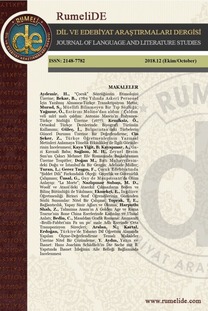Yahya ibn el-Hakem el-Gazel’de hikmetli şiir
Şair, felsefe ve hayatı anlatan şiirlerini
yazdığı zaman insanların akıllarının alamayacağı kadar hayatın karmaşıklığını
anlatmış ve aynı zamanda akla dayalı sosyal eleştirilerini yaparken çözüm önerilerinde
sunmuştur. Özellikle sosyal eleştiri içeren şiirlerinde şair, sosyal ve
toplumsal olayları anlattığı zaman felsefi görüşlerini de ortaya koymuştur.
Şairin görüşleri oldukça açık ve nettir. Şair, hayat tecrübesini özellikle
hayatının son aşamasında yazmış olduğu dini şiirlerinde yansıtmıştır. Böylece
şair hem kendi hem de hayatın sorunlarını anlamak için toplumun düşünce şeklini
anlamaya çalışmıştır. Çoğu zaman şair, hayatı anlatırken ölüm ve yaşam
temalarını şiirlerinde ele almıştır. Şaire göre yaşam ile ölüm arasındaki
mücadele özgürlük, sevgi ve değişimin sembolüdür.
Anahtar Kelimeler:
Yaşam, ölüm, sosyal eleştiri, felsefe, kasideler
Yahya ibn al-Hakam al-Kazal and his view toward life
It is quite normal, for the poet, to express the
philosophy of life and its wisdom through depicting the complexity of life in
which man is living. In other word, the poet intends to present solution to Man
who is confined with materialism throughout social criticism. In addition, the
realistic and the profound view of life have been presented while the poet
deals with social problems. In this sense, the poet is honest and realistic in
his confession. In the third phase of his life, the poet composed a collection
of poems which tackled with his own society as well as his experiences through
ascetical poetry. Poetry, for Al-Kazal, demonstrates the real life in which he
combined his personal and socialgrief. In other words, the poet becomes aware
or conscious upon his self, time and universe. By doing so‚ the poet intends to
say that life and its philosophy are related to each other. Death‚ for the
poet‚ means the dead of soul and past time. Thus‚ the struggle between life and
death in his poetical experiences means the struggle between freedom‚ love,
hostility and slavery, expatriation from place and history on the other hand.
Keywords:
Life, death, social justics, philosophy, poems,
___
- Abu Fazıl İbrahim, Muhammed (1985). Divanü’n-Nabiga ez-Zübyani. 1.Baskı, Kahire: Darul’l Ma’rifa. Abu’l- Haşab, İbrahim Ali (1970). Tarihu’l-Edebi’l-‘Arabî el-Endelüsî. Kahire: Daru’l-fikri’l-Arabi Atik, Abdülaziz (1976). Edebi'l-'Arabî fi el-Endelüsî. Beyrut: Darul el-Nehza el-Arabî. Behçet, Müncid Mustafa (1988). Edebü'l-Endelüsî min Fethi hatta sukûtî Granadatu. Musul: Daru’l-Kutup. el-Avsi, Hikmet Ali (1987). Fusulûn fi’l-Edebu’l-Endelûsi fi Karneyin el-Sani ve’l-Salisi’l-Hicreti. 5. Baskı, Bağdat: Babil. el-Bendak, Muhammed Salih (1979). Yahya bin Hakem el-Gazal Emirü’ş-Şuara el-Endelûs fi karni’s-salis el-hicri. 1.Baskı, Beyrut: Daru’l-afaki’l-cedidetun. el-Dayye, Muhammed Razvan (1993). Divanu Yahya bin Hakem el-Gazal. Beyrut: Daru’l-fikri’l-muasir. el-Fahuri, Hinnal (1960). Tarihu’l-Edebi’l-‘Arabî. Beyrut: Polisiyye. el-Makkari el- Telmesani, Ahmet bin Muhammed (2008). Nefhu’l teyip min husun el-endülüs el-ratiyip. Beyrut: Daru’s-sadr. el-Rukabi, Cevdet (1970). Fi’l-Edebu’l-Endelûsi. 3.Baskı, Kahire: Daru’l-Ma’rif. el-Zeyin, Ahmet ; Abu’l-Vefa, Mahmut (1985). Divan el- Hazeyliyin. Kahire: Daru’l-Kavmiyye. Heykel, Ahmet (1985). el-Edebü’l-Endelusî mine’l-Fethi ila Sukuti’l-Hilafe. Kahire: Daru’l-Ma’rif. Muhammed, Muhsin İsmail (2003). es-Sure’ş-Şaariye fi Şiiri Yahya bin Hakem el -Gazal el-Endelusi, (Granada: Granada üniversitesi,).
- ISSN: 2148-7782
- Yayın Aralığı: 6
- Başlangıç: 2014
- Yayıncı: Yakup YILMAZ
